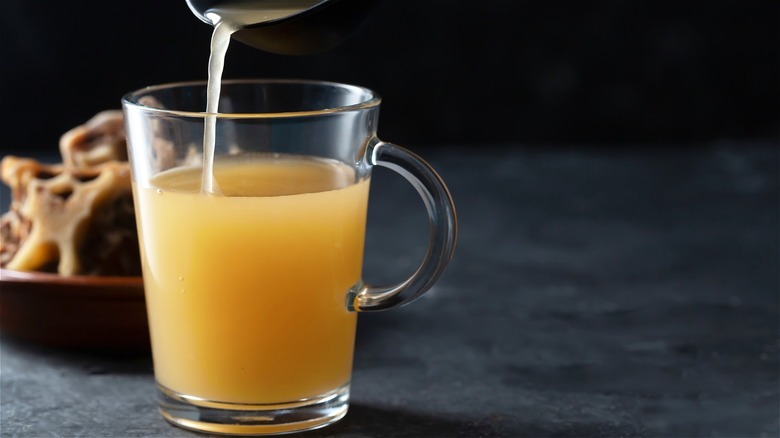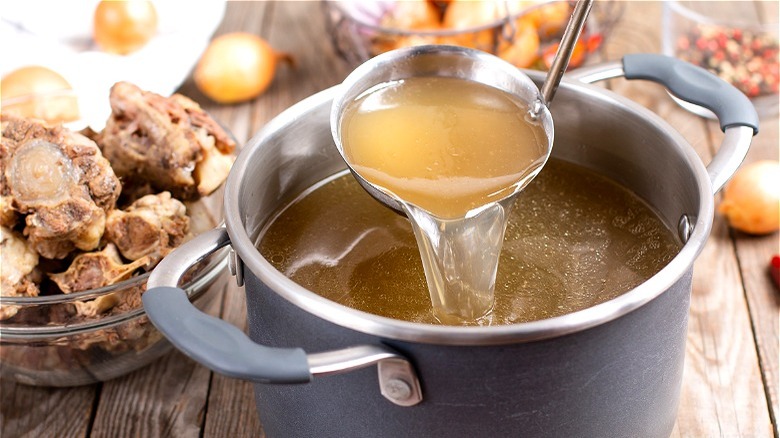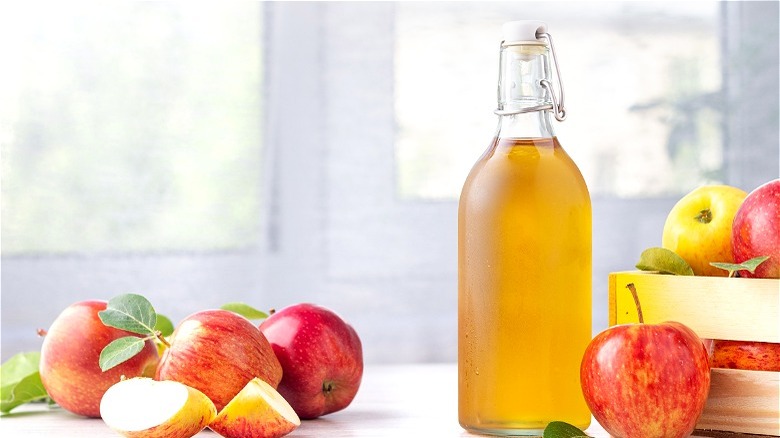What Are The Real Health Benefits Of Bone Broth?
According to Ossa Organic, bone broth has been used for over 2,000 years in Asian cultures for its medicinal claims, but is there real present-day science supporting the assertions behind this drink's cure-all properties? Healthline defines bone broth as a stock or 'health drink' generally composed of various animal bones and tissues that have been simmered in water for a long period of time. The bones are strained after 12 to 24 hours and the remaining liquid is used for drinking or as a nutritional base for sauces and soups.
The New York Times claims bone broth has become a trend of sorts, acting as a meal replacement and immune-supporting beverage for health-conscious consumers taking on the ever-popular Paleo diet. There are also claims that the collagen produced in the gelatinous liquid gets transformed into functional proteins and amino acids for the body (via Healthline).
The health benefits associated with the long-standing tradition of eating chicken soup when suffering from respiratory illness have been somewhat affirmed in one study from 2000. Yet, what research supports the claim that bone broth is an all-encompassing multi-faceted health elixir?
More research is needed to support health claims
According to Bonafide Provisions, one cup of the brand's chicken bone broth contains only 45 calories and 10 grams of protein. While that's a hefty amount of protein, the lack of research on bone broth is considerable due to the variety of bones used and the length of cook time for each individual recipe (per CDHF).
The first known study, "Bone and Vegetable Broth" was conducted in 1934, and researchers concluded that the nutritional components of broth (in this case for infants) were quite low when compared to other foods such as whole milk. One 2021 study does prove that bone broth supports the immune system in battling ulcerative colitis. However, most of the studies cited by organizations and brands focus on isolated ingredients inside bone broth, such as the 2008 study in the journal "Current Medical Research and Opinion," which found reduced pain in athletes who took collagen hydrolysate.
While there is nothing wrong with touting the benefits of collagen, an associate professor and biomedical scientist at the University of South Dakota, Dr. William H. Percy states "collagen is actually a pretty poor source of amino acids" and goes on to explain that even if you drank bone broth every day for a month and felt great, you'd benefit more from simply eating "milk or eggs" (per Time). Scientists believe additional research needs to be conducted and claim that most of the current hypotheses tend to only "sensationalize the benefits."
Adding apple cider vinegar to bone broth
Speaking of collagen, one 2018 study found extremely low quantities of amino acids in prepared bone broths when compared to collagen supplements. But what if you add apple cider vinegar to the supposed health drink? According to Kettle & Fire, adding just a small amount of raw apple cider vinegar before simmering will increase the liquid's nutritional content and draw out additional minerals from the bones.
Unfortunately, there are clashing opinions on the matter. Listed as one of the "4 things experts get wrong with bone broth" Bluebird Provisions states that adding apple cider vinegar is one of them. The brand supposedly tests its broth twice a year and found no nutritional differences between broths made with and without apple cider vinegar. There are also no studies to back the claim that ACV leaches nutrients out of simmering bones.
Besides the fear of apple cider vinegar rotting your teeth, Edwin McDonald, IV, MD cites many studies against ACV's claims to increase weight loss, fight high blood pressure, and house potential cancer-fighting power (per UChicago Medicine). The good news is the amount of ACV suggested for a large pot of stock is quite small (1 tablespoon to one-fourth cup per pot via Kettle & Fire), so the chances of ACV having any negative effect on your overall health are low. If you love the taste of bone broth, keep drinking, just don't lean too heavily on the purported health claims.


